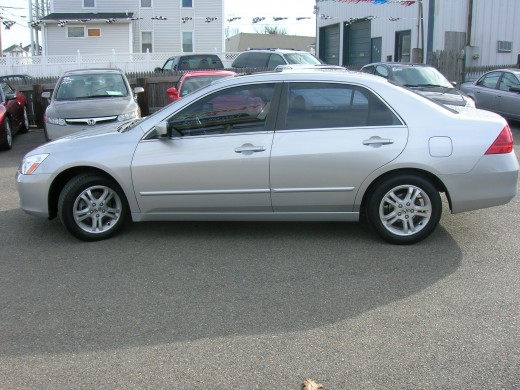Dealing with a Used Car Salesman. Some tips to help get the best possible deal!

Negotiations
To read part three: http://hubpages.com/hub/Dealing-with-a-Used-Car-Salesman-Part-3
Once you have picked out the new vehicle that you would like to own and you have come to terms on the price it is time to discuss your trade in if you have one. Always leave the trade out of the picture until the price is agreed upon. Doing this will let you know exactly what the dealer would be willing to buy your trade for. You may be surprised at what your trade is actually worth to a dealer. Once you find out you may want to donate the car to a charity to help with your taxes. You could give the vehicle to someone you know that could really use it.
If the dealer asks about your trade and if the salesman is any good he will ask, tell them you are giving it away whatever to push the subject off until later. there is a reason for this. The dealer will discount the vehicle you are trying to purchase and tell you they are giving you the discount as value for your car.
Example 1: Vehicle cost $20,000
No trade price: $17,500
Example 2: Vehicle cost $20,000
Price after trade $17,000 + your trade
The dealer will tell you he is giving you $2500 for your trade when in reality he is giving you only $500.00 for your car. Perception is reality and a lot of people are so happy with the amount of money they are being deceived into believing they are getting for their trade that they stop negotiating and lay down for the close.
Get your keys back as soon as someone from the dealership appraises your car. You will be held against your will by the dealer misplacing your keys. "Oh my manager has them in his pocket and we are trying to find him." If this happens freeze, do not discuss anything else with anyone until your keys are returned.
You should do your research on your vehicle's value before you enter into negotiations. North American Dealers Association or N.A.D.A. is what banks and insurance companies use to value a vehicle. Your dealer uses the same book. Now the book value is a guide, if your trade needs tires or has body rot, if your vehicle needs repairs or is just in overall bad condition you will never get book value for your car. If your car is perfect and needs nothing you could expect to get higher than the book value.
Do not be afraid to ask to see the N.A.D.A. book to see for yourself to see what the value is of your trade as well as the vehicle you are buying. You can also inquire with your insurance agent what the replacement value would be for your car. Your bank is another source for this information. Take the time to inform yourself as much as you can concerning what your trade is worth as well as what the vehicle you are trying to purchase is worth.
Four Square System
Once you agree on the price with the trade it is time to negotiate payments if you are financing through the dealer. To keep the dealer honest you should always check with your own bank to see what rate they would be willing to give you.
Rate is the percentage of interest that you will pay on the principal of the loan. Term is also important as you should try to get the longest term at the lowest rate possible. Term is the amount of time you will have to pay back the loan.
When you start negotiating with the dealer you will notice that there are four separate things that are the tools used to maximize profits for the dealer.
BOX ONE: The price of the car the dealer wants to stay away from this one as any lowering of price obviously lowers profit.
BOX TWO: The value of your trade, another one the dealer uses to commit you but any rise in the value of your trade also lowers profit.
BOX THREE: Cash down, the more cash you put down the easier it is for the dealer to hold to the price as cash will lower payment naturally.
BOX FOUR: Payment and term, The higher the payment over a longer term will mean profit to the dealer.
The first box and the second box are your boxes. Try to lower the price or up the value of your trade. Do not get tied up with financing until you can come to an agreement on price.
Once this is established and you are ready to talk about financing (hopefully you have already researched your own financing) ask what rate the payment is calculated at by the manager.
The salesman will tell you he cannot discuss rate. The reason for this is after you are worn out from negotiating the price the dealer has a well rested fresh Finance Manager to start the negotiating process again. Do not allow this to happen as by now you are probably a little stressed. When you are presented terms on a loan ignore cash down.
Cash down will lower your monthly payment once everything else is settled. You can ask this question: "How much will one thousand dollars lower my payment?" This way you can calculate for yourself how much cash you would desire to put down to get the payment to a comfortable level.
Bring your own calculator. You will find every calculator in the showroom disappears when you ask for one. Do not allow this form of control. Bring your own.
When you are presented with a payment you should be told three things.
What is the monthly payment?
What rate did you use to arrive at this payment?
How long is the term of the loan?
Get this in writing before signing contracts. The salesman will not give up his worksheet but you need to demand a copy of it. Front and back because if you are doing a good job the dealer should be writing all over the paper and probably in different color inks.
Red is a color used to psychologically trick you into believing that it is time for you to stop.
The dealer will not be able to answer these questions exactly until they obtain an approval from a bank. You will have to fill out a credit application to find out exactly what the terms of the loan will be.
Hopefully this advice will help you in dealing with the car dealer. I will discuss the inner workings of finance and other subjects in upcoming hubs. Thank you for reading my work.
© 2010 Arthur Fontes



